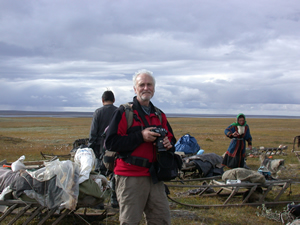Moscow 'hot spot' for Alaska climate scientists
Moscow ’hot spot’ for Alaska climate scientists
Submitted by Marie Gilbert
Phone: 907-474-7412
01/25/08

Download photo
FAIRBANKS, Alaska--Scientists from the University of Alaska Fairbanks, China, Finland, Norway and Switzerland are convening at the Russian Academy of Sciences in Moscow next week to share results from an interdisciplinary project investigating the consequences of climate change on the land, people, and ecosystem services of the Yamal region of northwest Siberia.
"The Yamal is a ’hot spot’ for studying Arctic climate change and land-use change because of the extensive human-caused disturbance and transformation of vegetation cover over the past 20 years following gas and oil development and overgrazing by reindeer herds," said meeting organizer Donald "Skip" Walker, professor of biology at the Institute of Arctic Biology at UAF.
The project is a collaboration among three International Polar Year initiatives: The Greening of the Arctic and the Circum-Arctic Rangifer Monitoring and Assessment Network projects, which are based at UAF, and the Cold Land Processes in the Northern Eurasia Earth Science Partnership Initiative.
Walker heads the GOA project which focuses on changes in vegetation patterns in the Arctic using remote sensing. Walker’s group examines how landscape, reindeer herding and resource development, combined with climate variations affect vegetation change and how those changes, in turn, affect herding by the Nenets people of the Yamal.
The Yamal project, part of NASA’s Land-Cover Land-Use Change program, will contribute to global-change observations particularly the consequences of the dramatic decline in the Arctic sea ice and the greening of terrestrial vegetation that is occurring in northern latitudes. The project addresses questions regarding the local and hemispheric effects of human-caused changes to land use and climate.
The project combines long-term records from Advanced Very High Resolution Radiometers, Landsat satellites and other sensors with the most recent sensors that provide highly detailed spatial and spectral information regarding land-cover and land-use change in the Arctic.
UAF scientists participating in the conference include Walker, Alaska Geobotany Center research associate Martha Raynolds, IAB/IPY post-doctoral fellow József Geml and atmospheric scientist Uma Bhatt and permafrost scientist Vladimir Romanovsky from the UAF Geophysical Institute.
For more information on the Nenets and the Greening of the Arctic project go to: www.uaf.edu/news/featured/07/greening
CONTACT: Donald "Skip" Walker, professor of biology, UAF Institute of Arctic Biology, 907-474-2460, ffdaw@uaf.edu. Marie Gilbert, public information officer, UAF Institute of Arctic Biology, 907-474-7412, marie.gilbert@uaf.edu
ON THE WEB: www.iab.uaf.edu


